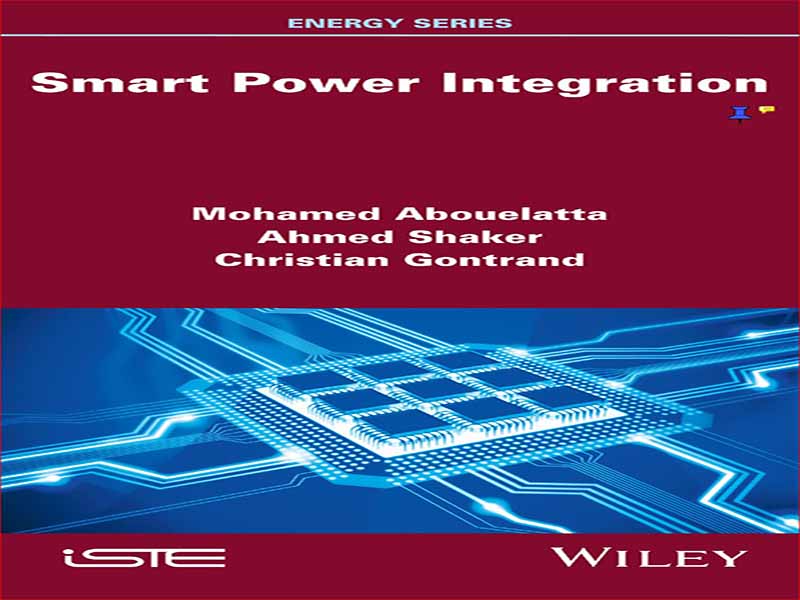- عنوان مجله: Smart Power Integration
- نویسنده: Mohamed Abouelatta
- حوزه: پاور
- سال انتشار: 2022
- تعداد صفحه: 323
- زبان اصلی: انگلیسی
- نوع فایل: pdf
- حجم فایل: 19.1 مگابایت
ادغام هوشمند فرآیندی است که در آن یک زیرساخت سیستم موجود از طریق ادغام چندین فناوری، به عنوان مثال، حسگرهای خودکار، کنترلهای خودکار پیشرفته و سیستمهای پیشبینی ارتقا مییابد. یک شبکه هوشمند امکان تعامل بین مصرف کنندگان را فراهم می کند و امکان استفاده بهینه از انرژی و سیستم های ارتباطی را بر اساس ترجیحات قیمت و استرس های فنی سیستم بدون فراموش کردن جنبه زیست محیطی فراهم می کند. کاهش مداوم ابعاد و نیاز به چگالی توان فزاینده، نیاز به سازه های کارآمدتر را برجسته کرده است. فناوری برق هوشمند برای پاسخگویی به این تقاضا توسعه یافته است. این فناوری از دستگاه های (L)DMOS استفاده خاصی می کند و به دلیل ویژگی های ولتاژ بالا و جریان بالا، راه حل های جدیدی ارائه می دهد. عملکرد این دستگاه ها با پدیده های متعددی همراه است. مدلسازی خوب این امکان را برای این پدیده ها و پیش بینی رفتار فیزیکی ترانزیستور قبل از تولید فراهم می کند. به این، محوری را اضافه می کنیم که اجتناب ناپذیر شده است: درهم تنیدگی بین دستگاه ها، مدارها، اتصالات و بسترها. طرحهای (ریز)شبکهای در سالهای اخیر با ادغام راهحلهای فناوری اطلاعات و ارتباطات (ICT) مانند هوش مصنوعی (AI) و یادگیری ماشین (ML) به طور قابل توجهی تکامل یافتهاند. یک ریزشبکه هوشمند، مجهز به حسگرها و کنترلهای اتوماسیون، میتواند به طور موثر پروفایل بار و پیشبینی، مدیریت تولید، اولویتبندی بار و غیره را انجام دهد. نمونهای از آن خودروهایی هستند که به سرعت به مرکز ارتباطات، ناوبری و اتصال تبدیل میشوند. راهحلهای خودرو با زیرساختهای شهر هوشمند، دستگاههای شخصی و خدمات داخل خودرو ادغام میشوند تا بخشی از یک کل متصل شوند.
Smart integration is a process in which an existing system infrastructure is upgraded through the integration of multiple technologies, for example, automated sensors, advanced automated controls and forecasting systems. A smart grid allows for interaction between the consumers and enables optimal use of energy and communication systems based on price preferences and system technical stresses, without forgetting the environmental aspect. The continuous reduction in dimensions and the need for increasingly high power density have highlighted the need for ever more efficient structures. Smart power technology has been developed to meet this demand. This technology makes specific use of (L)DMOS devices, offering new solutions because of its unique high voltage and high current characteristics. The operation of these devices is accompanied by a number of phenomena. Good modeling makes it possible to account for these phenomena and predict the physical behavior of the transistor prior to production. To this, we add an axis that has become unavoidable: the entanglement between devices, circuits, connections and substrates. (Micro)grid designs have evolved significantly in recent years with the incorporation of information and communication technology (ICT) solutions, such as artificial intelligence (AI) and machine learning (ML). A smart microgrid, equipped with sensors and automation controls, can efficiently perform load profiling and forecasting, generation management, load prioritization, etc. A go-to example is the vehicles that are quickly becoming a center of communication, navigation and connectivity. Automotive solutions will integrate with smart city infrastructures, personal devices and in-vehicle services to become part of a connected whole.
این کتاب را میتوانید از لینک زیر بصورت رایگان دانلود کنید:
Download: Smart Power Integration



































نظرات کاربران